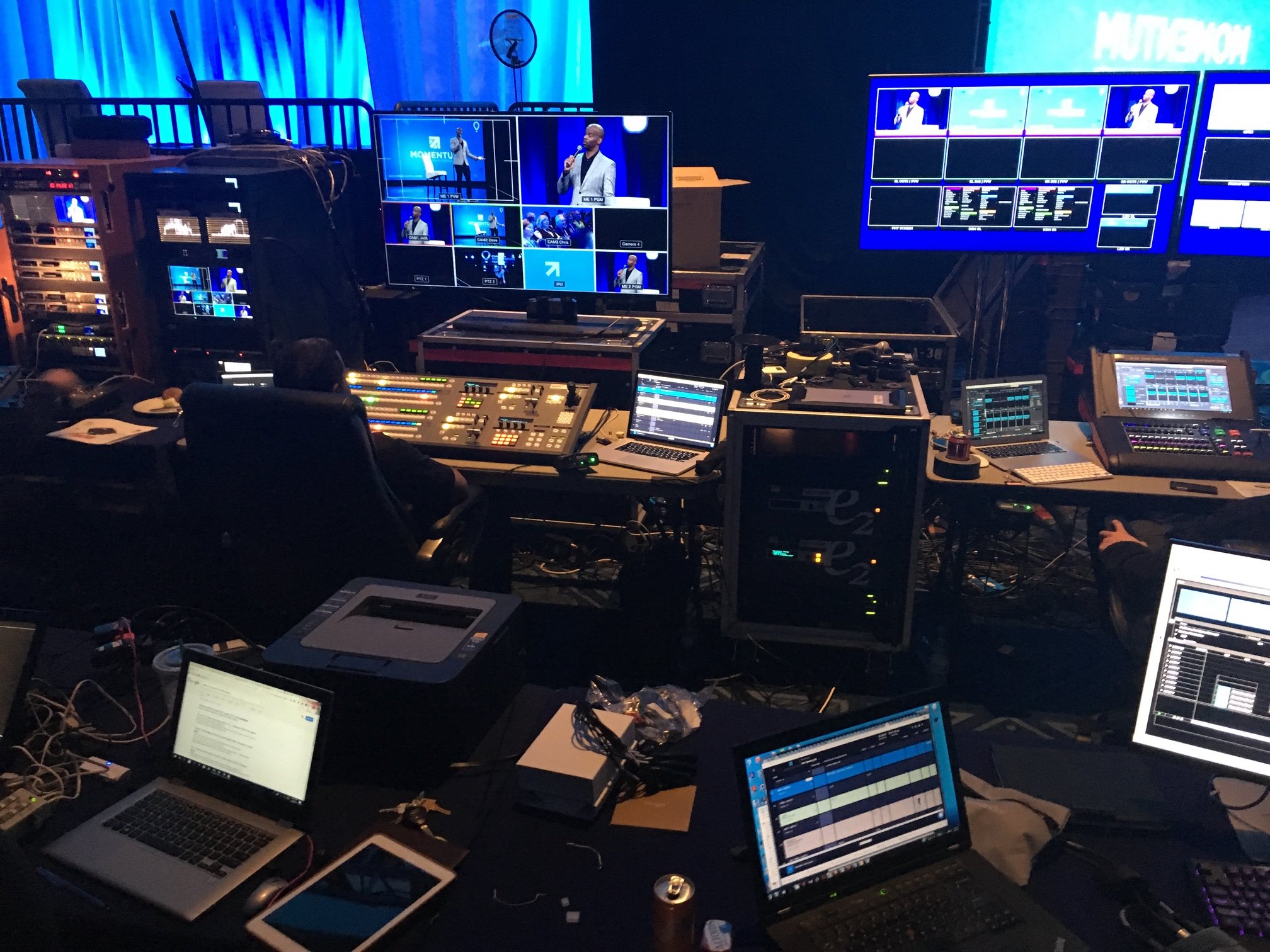Exactly How Event Production Works: A Comprehensive Consider the Refine
Event production is a complex and organized process that needs careful planning and execution. It starts with establishing clear purposes and recognizing the target audience. Each step, from budgeting to location option, plays an important role in guaranteeing success. As the procedure unravels, numerous aspects should straighten flawlessly. Yet, the nuances of this intricate operation typically go unnoticed. What are the essential phases that add to an unforgettable event?

The Preliminary Drawing Board
When beginning on event production, mindful planning is necessary to ensure an effective result. The preliminary drawing board functions as the structure for all succeeding initiatives. Throughout this phase, event manufacturers have to specify the event's objective and objectives plainly. Determining the target audience helps customize the experience and messaging, ensuring importance and engagement.Producers have to additionally take into consideration the event layout, whether it be in-person, digital, or hybrid, as this will affect different logistical aspects. Picking an ideal date and venue is crucial, as it influences ease of access and availability.Furthermore, constructing a trusted team is basic for separating obligations and improving interaction. Developing a timeline with milestones guarantees all tasks are finished on routine. This phase includes detailed study, consisting of recognizing possible obstacles and developing strategies to minimize dangers. Inevitably, a well-structured initial planning phase establishes the tone for an effective event production journey.

Budgeting and Source Allocation
In event production, reliable budgeting and resource allotment are crucial for success - event production charlotte. Establishing economic specifications establishes the foundation for all succeeding choices, while resource circulation methods guarantee that every element of the event is appropriately sustained. With each other, these aspects assist keep control over expenditures and maximize making use of readily available sources
Developing Financial Parameters
Establishing financial parameters is crucial to the success of any type of event production, as it sets the foundation for efficient budgeting and source allowance. This procedure begins with specifying the total budget plan, which incorporates all facets of the event, including place expenses, food catering, and advertising. By recognizing available funds, event planners can prioritize expenditures and allocate resources appropriately. On top of that, it is crucial to carry out complete market research to prepare for potential prices and determine funding resources, such as sponsorships or ticket sales. Establishing clear financial specifications additionally help in risk management, permitting coordinators to allot backup funds for unanticipated expenses. Ultimately, a distinct spending plan offers as a roadmap, guiding the event production group towards accomplishing their goals while keeping economic control.
Source Distribution Techniques
Efficient source circulation strategies are vital for optimizing the impact of an occasion while sticking to budget constraints. Effective event production requires a thorough technique to budgeting and source allocation. Coordinators need to focus on necessary aspects such as place, wedding catering, and innovation, making certain that funds are alloted to locations that enhance attendee experience. A thorough budget must detail anticipated expenditures and identify areas for possible cost savings, such as discussing with suppliers or discovering sponsorship chances. Furthermore, tracking expenditures throughout the planning procedure aids stop overspending. By utilizing tactical source distribution, event manufacturers can supply a memorable experience while keeping fiscal responsibility, ultimately adding to the general success of the event.
Place Choice and Logistics
Picking the ideal place is vital to the success of any type of event, as it sets the phase for the general experience. Location choice involves evaluating numerous variables, consisting of ability, ease of access, and area. Coordinators need to think about the target market and the nature of the event, making certain the place lines up with the event's goals.Logistics play a substantial role in this process, entailing arrangements for seating, audiovisual devices, and catering services. An appropriate location should promote smooth flow for guests and staff, enhancing engagement.Additionally, evaluating potential venues for amenities like car parking, toilets, and fire escape is necessary for safety and security and ease. The timeline for safeguarding the place is also crucial, as popular areas may schedule quickly - event production charlotte. Extensive planning and timely execution can ultimately contribute to a smooth event experience, making venue choice and logistics essential parts of successful event production.
Creative Principle Growth
While the venue sets the physical stage, imaginative concept advancement forms the event's identification and story. This process starts with determining the event's objective and target market, enabling event producers to formulate an engaging motif that reverberates with participants. Conceptualizing sessions commonly include varied perspectives, cultivating ingenious ideas that straighten with the event's goals.Once a motif is developed, visual aspects such as shade schemes, signs, and decoration are made to enhance the total ambience. Storytelling methods might also be integrated to produce an engaging journey for individuals, assuring an unforgettable experience. Additionally, factors to consider pertaining to amusement, tasks, and interactive components are aligned with the chosen principle, strengthening the motif throughout the event.Ultimately, effective innovative concept advancement warranties that every element of the event works cohesively, leaving an enduring impact on attendees and meeting the event's purposes. This foundational job lays the groundwork for succeeding planning and execution stages.
Working together With Vendors and Vendors
Effective event production hinges on efficient cooperation with vendors and providers. Picking reputable partners, bargaining contracts properly, and guaranteeing prompt deliveries are crucial action in this process. Each of these factors contributes significantly to the general success and smooth execution of an event.
Choosing Reliable Partners
How can event organizers guarantee a seamless production experience? Choosing reliable partners is important in achieving this objective. Event coordinators should carry out detailed study to determine suppliers and vendors with a proven record of excellence. This includes examining referrals, assessing portfolios, and evaluating client responses. Planners need to focus on partners who demonstrate expertise, prompt communication, and a readiness to collaborate. Structure solid partnerships fosters trust and allows fast analytic throughout the event. In addition, it is valuable to pick neighborhood vendors see this here that recognize the venue and local logistics. Eventually, a successful event depends upon the harmony between organizers and their companions, guaranteeing check this that every aspect of production runs smoothly and efficiently.
Discussing Contracts Effectively
Effective arrangement of contracts is an essential step in the collaboration in between event organizers and their vendors and suppliers. This process includes clear interaction of expectations, deliverables, and timelines. Planners need to carry out extensive study on market prices and sector requirements to establish a baseline for arrangements. It is essential to create a collaborative ambience, urging open discussion regarding terms, rates, and potential contingencies. Planners should additionally prioritize recognizing the vendor's capabilities and limitations to align their demands successfully. Adaptability can cause mutually advantageous arrangements, fostering long-term connections. Crafting distinct contracts that consist of specific efficiency metrics can assist ensure accountability, inevitably bring about successful event implementation and satisfaction for all parties included.
Guaranteeing Prompt Deliveries
Prompt shipments are vital for the smooth execution of any event, calling for thorough collaboration in between coordinators and their vendors and providers. Reliable interaction is essential, as it helps develop clear assumptions relating to shipment schedules, amounts, and details requirements. Planners often develop thorough timelines to describe critical landmarks, ensuring all parties remain lined up throughout the process. Normal check-ins with suppliers can aid recognize possible delays early, enabling proactive services. In addition, developing solid relationships with trustworthy providers fosters trust and accountability, which can lead to better service and prioritization. By focusing on these joint efforts, planners can reduce disturbances, therefore improving the overall efficiency of event production and making sure that all essential materials and services arrive as planned.
Advertising and Promotion Techniques
While arranging an event, the success of advertising and marketing and promo techniques can greatly affect attendance and involvement. Effective strategies typically consist of a combination of electronic advertising and marketing, conventional advertising, and grassroots outreach. Making use of social networks platforms allows for real-time interaction and targeted marketing, getting to specific demographics efficiently. Email advertising projects can even more engage prospective guests with customized content and reminders.Collaborations with influencers or industry leaders can likewise enhance trustworthiness and widen reach. Creating engaging content, such as videos or blog sites, assists to create buzz and sustain rate of interest leading up to the event. In addition, leveraging early-bird discounts and exclusive benefits can incentivize ticket purchases.Promoting via typical channels, such as posters or neighborhood media, stays relevant, specifically in community-focused events. A detailed approach that integrates numerous strategies assurances maximum presence and interaction, eventually adding to the event's success and the production of a remarkable experience for participants.
On-Site Execution and Management
On-site execution and monitoring are essential components that identify straight from the source the general success of an event. Efficient control during the event guarantees that all elements straighten with the intended schedule. Event supervisors supervise logistics, including vendor coordination, devices arrangement, and visitor solutions. Keeping track of timelines and dealing with any kind of unforeseen issues are fundamental for keeping a seamless experience.The team plays a considerable duty, as trained personnel are in charge of numerous tasks such as enrollment, info dissemination, and technological support. Interaction among employee is necessary; it fosters a joint atmosphere and makes it possible for fast resolution of challenges.Additionally, safety protocols should be abided by, guarding the wellness of all attendees. Post-event analyses are likewise component of on-site management, offering understandings for future enhancements. By concentrating on these elements, event producers can develop memorable experiences that satisfy or surpass guest assumptions while attaining the event's objectives.
Often Asked Inquiries
Just how Do I Pick the Right Event Style?
Choosing the right event theme includes considering the target market, event objective, and location. Looking into current patterns and collecting input from stakeholders can likewise motivate innovative ideas that resonate and produce an unforgettable experience.

What Prevail Mistakes in Event Production?
Usual mistakes in event production usually include insufficient preparation, inadequate interaction among staff member, budget mismanagement, overlooking to consider the audience's requirements, and falling short to carry out a detailed post-event evaluation for future improvements.
Exactly How Can I Determine Event Success?
To measure event success, one can analyze guest satisfaction, engagement levels, budget adherence, and post-event comments. Trick performance indicators, such as ticket sales and social media communications, likewise offer valuable understandings right into general performance.
What Should I Do if It Moistens the Event Day?
In case of rainfall on the day, the coordinator should implement contingency plans, such as protecting tents or relocating tasks indoors. Interaction with guests about changes is vital to ensure a smooth experience in spite of climate obstacles.
Just How Can I Ensure Attendee Involvement Throughout the Event?
